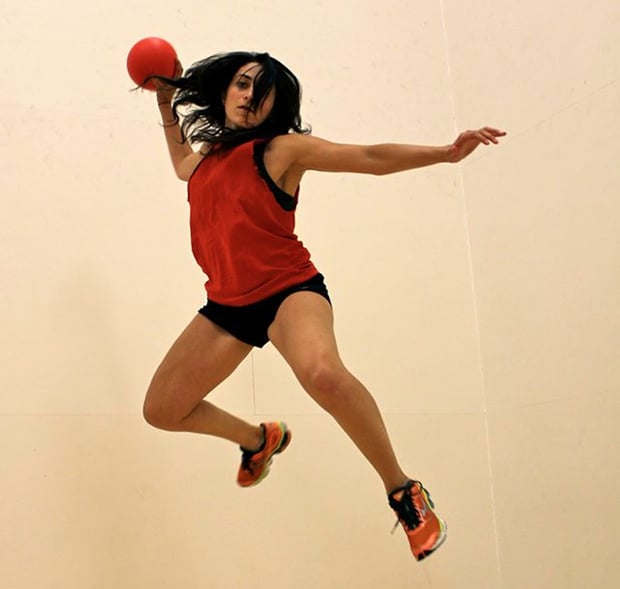If you ever took a gym class growing up, chances are you’ve played dodgeball. The sport involves throwing balls at the other team without crossing the court line, attempting to hit each opponent until you’re the last one standing. But the sport DC resident Paniz Asgari is playing these days is not your average dodgeball game followed by drinks at a nearby pub. Watch her video reel as she whips rubber balls at opponents over and over, and you’ll be grateful that you’re not on the other side of that line.
Asgari is one of the six women selected for this year’s USA dodgeball team, which travels to New Zealand later this month for the second annual World Dodgeball Federation tournament on September 27. We caught up with her before she heads down under for the one-day tournament. Read on to learn how she snagged a spot on the team and how she’s preparing for the big day.
You started out as a collegiate soccer player at Christopher Newport University. How did that evolve into dodgeball?
I’ve always been a fanatic when it comes to playing sports. Growing up, I played soccer, dodgeball, kickball, basketball, tennis—I just played everything. My parents were like, “You have energy; let’s get rid of it.” Dodgeball came about, and I played in elementary school. Then I played again four years ago. There was a Groupon that came out for a local league, which is now United Social Sports. I joined up, and it truly became this addiction where I looked forward to Thursday every day, every week. Thursday night was the night to play dodgeball. I call it a healthy addiction.
How did you get selected for the USA dodgeball team?
I’d been playing dodgeball for a couple of years, and a lot of the girls get to know each other after a while. One of them suggested I should try out, but I didn’t know this even existed—this idea of a national team for dodgeball. So the way the selection process works is you record a full-length game video and send it in. Two weeks from then, it’s 5 PM at office and I look at my phone and there are the words, “Welcome Paniz Asgari to the USA dodgeball team.” I’m sitting in my office, not saying a word but screaming silently with excitement and fist pumping. That’s exactly what happened. It was a sense of total disbelief and utter delight.
Tell us about the world championship. What can your team expect?
It’s really exciting. It’s a one-day thing. All the men and women selected for the USA dodgeball team are heading to New Zealand by September 26—we meet for the first time there. The next day is practice. Then we go through a series of games, and the final competition. So it’s all one day, and about eight hours long.
This is only the second world championship. Can you talk about the growth of dodgeball?
It’s a sport that started in Africa where tribes would compete against each other in the form of battling. It was to build camaraderie between the tribes, so they would learn to work together and fight together. It came to the US in the late 1800s, but dodgeball really took off once the movie Dodgeball came out, which gave it some awareness and popularity. That’s when you saw the big move, and it became a social sport.
Most of us only know dodgeball as a game we played in elementary school. This seems a lot more intense. Have you had any major injuries from playing it?
Other than the massive bruises I get on my legs and arms, thankfully no. But there have been people who have had to get stitches on the head. They jump back and hit their head on the cement-block wall. You have your token broken fingers or sprained fingers, but thankfully I’ve been injury-free and plan to stay that way.
You play dodgeball with rubber balls, but this championship will use foam balls. Why is that?
I asked the same question. It’s simply that foam is more accessible in more countries—it’s cheaper for individuals to purchase.
Have you done any cross-training to prepare for the tournament?
To increase my dodgeball strength-training, if you will, I picked up a Wednesday-night league that I now host with United Social Sports. It’s a foam dodgeball league. I play in the league and host it, and that gave me a second chance to play dodgeball during the week and get to know foam dodgeball. I also picked up soccer with a couple of teams, playing three or four times a week. And I supplement that with [the workout program] Insanity. It’s an endurance sport, and if you’re going to play several teams in eight hours you’re going to have to some sort of fitness to keep up.
What was your parents’ reaction when they found out you had been selected for the team?
They were proud, like any parent would be. My parents came from everything in Iran. They left it and started with three young kids and my grandma in a one-bedroom house in Fairfax. I look at that, and I cannot imagine at my age of 29 going to a foreign country and starting my life all over. So I have everything to be grateful for and every opportunity in the world to represent myself and my country and the USA.
You can watch Asgari and the USA dodgeball team compete on September 27 via Asgari’s Facebook page, which will live-stream the tournament. To help send Asgari to the tournament, visit her fundraising page.


















